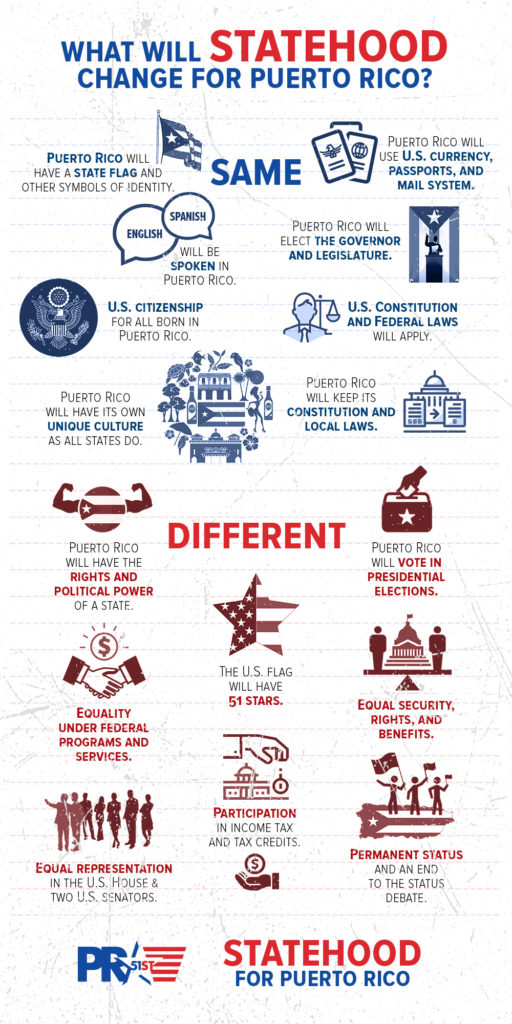
America was founded on the principles of equality and democracy. Yet after 123 years under the U.S. flag, Congress continues to deny them both to 3.2 million U.S. citizens in Puerto Rico.
Territory Status Denies Equal Rights, Separating Families & Communities
As an unincorporated territory, Puerto Rico is subject to federal laws and is under the control of Congress. Puerto Rico can’t vote in presidential elections and has no senators or voting members of the House of Representatives. The Island receives less federal support than it would if it were a state, has much higher rates of poverty than any state, and cannot fully develop its economy. As a result, Puerto Rico has lost close to 12% of its population in the last decade alone according to the U.S. Census, with almost all of those people relocating to the states. This trend, which has been consistent since at least the year 2000, is projected to continue to devastating effect.
Congress Must Take Action Now
This is a ticking time-bomb and Congress needs to take action quickly. While recent efforts to address disparities in federal programs for Puerto Rico are a welcome development, they are simply not enough. Puerto Rico needs a game changer, which is why voters in Puerto Rico have chosen statehood three times in the last 10 years. Now Congress must respect and act on the will of the majority of voters. The people of Puerto Rico don’t want mere parity, they want full equality and democracy, and that is only available within the U.S. Constitution through statehood.
Now the members of the House Committee on Natural Resources are on the verge of taking action to address this century-old issue. After two hearings held earlier this year on H.R. 1522, The Puerto Rico Statehood Admissions Act, Chairman Raul Grijalva has said that he intends to hold a mark-up session now that he has gotten a memorandum from the U.S. Department of Justice (DOJ) on whether H.R. 1522 and a competing bill, H.R. 2070, present any conflicts with the U.S. Constitution.
Constitutional Problems with H.R. 2070
The DOJ said that H.R. 2070 raises several conflicts with the Constitution:
- It opens the possibility of considering “enhanced commonwealth” options which have already been declared unconstitutional by every branch of the federal government.
- It lays an unprecedented change in the rules for Congress and declares that Congress must vote to ratify the choice made by the people of Puerto Rico, making a promise to voters that simply cannot be kept.
- It sets a spending cap on political campaigns.
- It calls for a congressional committee to make recommendations on language and culture to Puerto Rico.
The real purpose of H.R. 2070 is to delay the admission of Puerto Rico as a state. It presents a multi-year process which ignores the 2020 vote for statehood, as well as the 2012 and 2017 votes. It does not have the support of Puerto Rico’s top elected representatives. It also has so many complex and quirky requirements that it cannot be passed as-is.
H.R. 1522 – An Effective Solution
However, H.R. 1522 offers none of these conflicts. It uses the same process Hawaii and Alaska used to become states in 1959 by presenting Puerto Rico with a formal offer of statehood and allowing voters to make the final decision. If a majority votes for statehood again then the option gets implemented after a brief transition period. The bill has been vetted by multiple constitutional scholars and there are no constitutional issues with H.R. 1522.
The Committee can choose to mark up both bills back-to-back, or there may be a compromise bill. What is unacceptable is for the Committee to do nothing, and shirk its responsibility to address the fundamental issue impacting the lives and futures of millions of U.S. citizens in Puerto Rico.
Call to Action – Pass H.R. 1522 Now!
We believe all Americans deserve citizen equality and full voting rights at the federal level. If you agree then you must support immediate passage of H.R. 1522!

